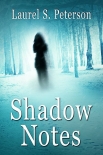Shadow Notes by Laurel Peterson (cool books to read txt) 📗

- Author: Laurel Peterson
Book online «Shadow Notes by Laurel Peterson (cool books to read txt) 📗». Author Laurel Peterson
So much for checking out the crowd.
Of course, Mother created seating charts. She alternated men and women, broke up couples, and put rivals (usually) at opposite ends of the table. I was seated next to Hugh, a not unsurprising choice, given that I’d replaced Mary Ellen Winters, my mother’s oldest enemy. Their enmity began long before I was born, and Mother had never deigned to tell me its source. What amused me was the subtext: Mary Ellen would see being seated next to Hugh Woodward as a message from my mother: “Get some help.”
Hetty sat across from us, watchful, her bare, buff arms shining in the candlelight. Mother sat at the far end of the table, with a polished-looking man, silver-haired and square-jawed, to her right. Hugh Woodward was also handsome, but the softness in his cheeks and gut would soon shape him like a whiskey bottle. He had been my mother’s therapist for twenty years. I’d overheard gossip in town that an affair between them broke my father’s heart. Whether it was true or not, Mother’s independent self couldn’t be touched by either my father or me.
The line between therapist and friend was blurred early on. Hugh frequented our family dinners and often spent holidays with us. After my father died, Mother always mentioned Hugh in the Christmas and birthday cards that never failed to find me, no matter where in the world I was hiding. He was the perfect person to answer my questions.
I looked down the table at Mother, this woman whom I mirrored in so many respects. We were both petite and lithe, shared the same green eyes with the littlest uptick in the corners, and long thin toes that made finding sandals difficult. We both laughed with a gurgle. We liked Mendelssohn and take-out Chinese. Not that she told me these things: I knew from watching her, seeing the take-out cartons in the refrigerator, and eavesdropping on her conversations. I knew she kept a stash of detective novels by her bed; at nine or ten years old, I’d snuck into her bedroom when she was out for a forbidden read. Curling into the pillows on her bed, I smelled her perfume, lay where she lay, tried to become her for those few precious hours.
Unfortunately, rumors like the one about Hugh Woodward and my mother linger in the community brain, making inroads like worms in dirt. I know part of the motivation for what I did was that rumor, a pure, driving need to know my mother. But finally, we are all unknowable, the psyche impossible to collapse into a package that can be dissected and neatly labeled. It didn’t stop me from trying, from trampling into the spaces others wished to keep private.
“So, Clara. Constance tells me you might be job-hunting in the new year.” Hugh spooned up some of the delicate scallop soup that comprised my mother’s first course.
Leave it to Mother to share my life along with her own. “Yes. Maybe.” If I hadn’t returned to Paris.
“Something using your degree in landscape architecture?” It sounded patronizing, but it was hard to tell since his mouth was full of roll.
“Mm. My Ph.D. From Harvard.” I couldn’t resist.
“Yes, I remember. What have you been doing with all that education?” he asked.
“A little of this, a little of that.”
As Hugh knew, I didn’t have to work. I’d inherited my father’s money, half his landscape architecture business, and his passion for the land. While that passion had propelled me through graduate school, I had never taken on my half of the business, and had instead let father’s partner handle it for the last fifteen years. Any work I’d done had been short-term because I needed to explore the world.
Hugh said, “You don’t sound thrilled.”
I laughed and drank a little more wine. I had to finish this glass. A different wine would be served with the next course. “It’s kept me busy enough I suppose.”
At the laugh, he’d turned and looked at me, assessing. He seemed to notice everything—the blonde hair, the green eyes, the pointy chin and freckles, the skinny, pale mouth. Some men found the combination appealing, but Hugh’s thoughts weren’t clear. I suppose psychologists have long practice in bland, neutral faces. “We haven’t seen you in a long time, Clara.”
Mother’s servers came by right about then and unloaded another half bottle of wine—a new one—into my Baccarat and Hugh’s. Cleared the soup. Brought the first course, a pasta tossed with golden caviar on a gold-rimmed plate. I dizzily twirled some around my fork, noticed Hetty staring at Hugh again.
“I’ve been avoiding the place.” I laughed once more, taking in the voluptuous flower arrangements, the crystal chandeliers, the excess of small, white, glittering candles, Hetty’s intense and inquiring face across the table.
“What a lovely laugh you have,” he said. “So different from your mother’s.”
After that, it was easy. Hugh and I slipped out separately, after the dessert course, upstairs to my childhood bedroom, redecorated to Mother’s taste in black, white and gold silk. No one would interrupt us here.
We returned in time for after-dinner brandy. Mother always brought in the Methodist church choir to sing carols (strange, as we were Episcopalian, but our choir never was worth much, except in their stock portfolios). They’d reached “Joy to the World.” Mother, still seated next to that handsome man, silver-haired, distinguished, knowing—someone I’d never seen before—slid Hugh a cool look. Me she ignored. Nothing new about that. She didn’t say anything later either.
And then, Hugh was dead, and I figured we didn’t have to talk





Comments (0)